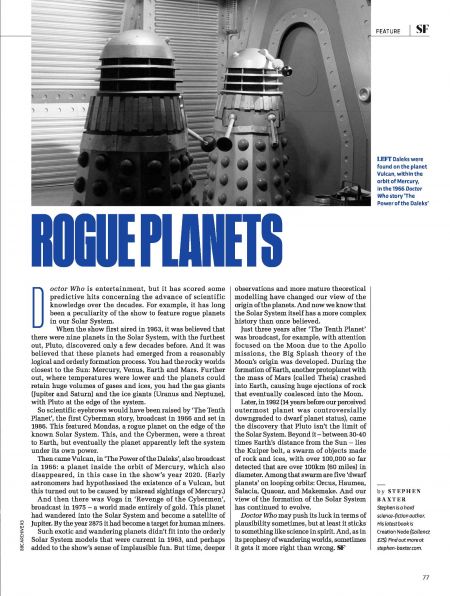Rogue Planets
- Publication: BBC Science Focus
- Date: Nov. 2023
- Author: Stephen Baxter
- Page: 77
- Language: English
Doctor Who is entertainment, but it has scored some predictive hits concerning the advance of scientific knowledge over the decades. For example, it has long been a peculiarity of the show to feature rogue planets in our Solar System.
When the show first aired in 1963, it was believed that there were nine planets in the Solar System, with the furthest out, Pluto, discovered only a few decades before. And it was believed that these planets had emerged from a reasonably logical and orderly formation process. You had the rocky worlds closest to the Sun: Mercury, Venus, Earth and Mars. Further out, where temperatures were lower and the planets could retain huge volumes of gases and ices, you had the gas giants (Jupiter and Saturn) and the ice giants (Uranus and Neptune), with Pluto at the edge of the system.
So scientific eyebrows would have been raised by 'The Tenth Planet', the first Cyberman story, broadcast in 1966 and set in 1986. This featured Mondas, a rogue planet on the edge of the known Solar System. This, and the Cybermen, were a threat to Earth, but eventually the planet apparently left the system under its own power.
Then came Vulcan, in 'The Power of the Daleks', also broadcast in 1966: a planet inside the orbit of Mercury, which also disappeared, in this case in the show's year 2020. (Early astronomers had hypothesised the existence of a Vulcan, but this turned out to be caused by misread sightings of Mercury.)
And then there was Voga in 'Revenge of the Cybermen', broadcast in 1975 — a world made entirely of gold. This planet had wandered into the Solar System and become a satellite of Jupiter. By the year 2875 it had become a target for human miners.
Such exotic and wandering planets didn't fit into the orderly Solar System models that were current in 1963, and perhaps added to the show's sense of implausible fun. But time, deeper observations and more mature theoretical modelling have changed our view of the origin of the planets. And now we know that the Solar System itself has a more complex history than once believed.
Just three years after 'The Tenth Planet' was broadcast, for example, with attention focused on the Moon due to the Apollo missions, the Big Splash theory of the Moon's origin was developed. During the formation of Earth, another protoplanet with the mass of Mars (called Theia) crashed into Earth, causing huge ejections of rock that eventually coalesced into the Moon.
Later, in 1992 (14 years before our perceived outermost planet was controversially downgraded to dwarf planet status), came the discovery that Pluto isn't the limit of the Solar System. Beyond it—between 30-40 times Earth's distance from the Sun — lies the Kuiper belt, a swarm of objects made of rock and ices, with over 100,000 so far detected that are over 100km (60 miles) in diameter. Among that swarm are five 'dwarf planets' on looping orbits: Orcus, Haumea, Salacia, Quaoar, and Makemake. And our view of the formation of the Solar System has continued to evolve.
Doctor Who may push its luck in terms of plausibility sometimes, but at least it sticks to something like science in spirit. And, as in its prophesy of wandering worlds, sometimes it gets it more right than wrong.
Stephen is a hard science-fiction author. His latest book is Creation Node (Gollancz £25). Find out more at stephen-baxtercom.
LEFT Daleks were found on the planet Vulcan, within the orbit of Mercury, in the 1966 Doctor Who story 'The Power of the Daleks'
Disclaimer: These citations are created on-the-fly using primitive parsing techniques. You should double-check all citations. Send feedback to whovian@cuttingsarchive.org
- APA 6th ed.: Baxter, Stephen (Nov. 2023). Rogue Planets. BBC Science Focus p. 77.
- MLA 7th ed.: Baxter, Stephen. "Rogue Planets." BBC Science Focus [add city] Nov. 2023, 77. Print.
- Chicago 15th ed.: Baxter, Stephen. "Rogue Planets." BBC Science Focus, edition, sec., Nov. 2023
- Turabian: Baxter, Stephen. "Rogue Planets." BBC Science Focus, Nov. 2023, section, 77 edition.
- Wikipedia (this article): <ref>{{cite news| title=Rogue Planets | url=http://cuttingsarchive.org/index.php/Rogue_Planets | work=BBC Science Focus | pages=77 | date=Nov. 2023 | via=Doctor Who Cuttings Archive | accessdate=25 December 2025 }}</ref>
- Wikipedia (this page): <ref>{{cite web | title=Rogue Planets | url=http://cuttingsarchive.org/index.php/Rogue_Planets | work=Doctor Who Cuttings Archive | accessdate=25 December 2025}}</ref>

